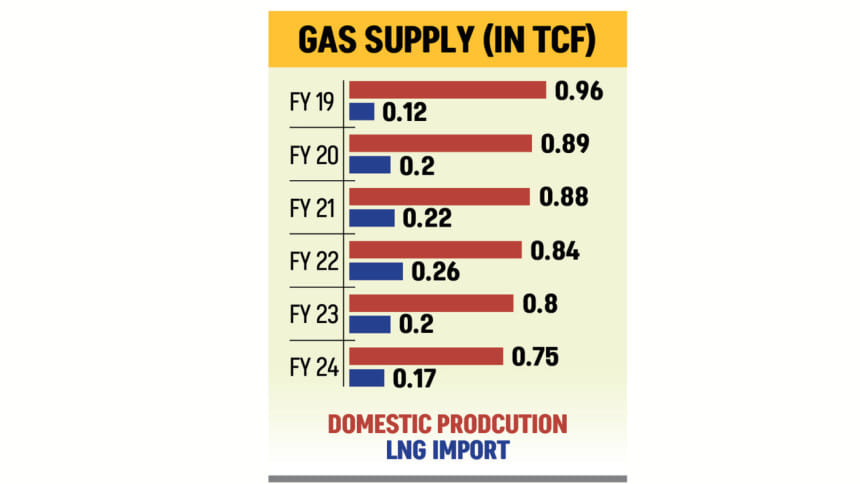‘Energy budget mirrors past regime’s policies’

By not introducing any major changes in priorities, the interim government appears to have followed the previous administration's approach to preparing the budget for the Ministry of Power, Energy and Mineral Resources, the Centre for Policy Dialogue (CPD) observed yesterday.
Speaking at a discussion, CPD analysts said the government has no plans to address the financial crisis facing the Bangladesh Power Development Board, nor is there any move to prioritise domestic gas supplies over imported liquefied natural gas (LNG).
They pointed out that although the government has doubled the Energy Division's budget, the allocation remains insufficient to realise its plans to reduce import dependency and boost domestic supply by investing resources in gas exploration.
Flawed fuel pricing mechanisms remain in place, and there is still a lack of major investment to accelerate the transition to renewable energy, they further noted.
A panel of experts made the observations at a discussion titled "Can the Interim Government Meet Expectations?" organised by the think tank at the capital's Brac Centre Inn.
The proposed budget for the 2025-2026 fiscal year was presented earlier this month and approved by the Cabinet on June 22.
According to the budget, the allocation for the Power Division has been slashed by nearly 30 percent, with the government aiming to reduce the subsidy burden by around Tk 11,000 crore.
"Most of the cost-cutting was done in the development budget. But there has been an increase in the operating budget, from which the unnecessary expenditures were supposed to be reduced," said the CPD's senior research associate Helen Mashiyat Preoty while presenting the keynote paper.
The Power Division has urged the finance ministry to convert its Tk 56,600-crore debt into subsidies, citing substantial losses from purchasing electricity at high prices from private rental, quick rental, and independent power producers, revealed the keynote paper.
The share of coal and LNG used in power generation has increased and will continue to do so, given the inability of oil-based power plants to make adequate contributions, the paper also mentions.
The interim government aspires to shift from fossil fuels to renewable energy, aiming for a green and sustainable power and energy sector, but the slowdown in policy shift does not reflect that aspiration, it added.
Prof M Shamsul Alam, energy adviser to the Consumers Association of Bangladesh, said the companies involved in power generation and supply are still logging substantial profits while the public continues to suffer.
"The people's voices are not being heard. There's almost no point in talking to the government anymore."
He provided the example of the Bangladesh Petroleum Corporation's recent decision to increase the Padma Oil Company's profit margin by 76 percent for supplying jet fuel to airliners at a time when the company has Tk 2,100 crore in reserves.
"They [Padma oil] are building two giant offices in Dhaka and Chattogram, operating schools and hospitals with the profit money from the public… This is not fair."
He went on to say that if the ongoing gas crisis at industries lingers any longer, most of them will go bankrupt soon.
Faisal Samad, a director at the Bangladesh Garment Manufacturers and Exporters Association, said the government has no plan to mitigate the energy crisis in industries. "We need an immediate short-term plan on how to increase gas supply to the industries."
He suggested some solutions, such as suspending gas bills for a few months or waiving interest payments on bank loans for industries.
Razeeb Haider, director at Bangladesh Textile Mills Association, said, "We need the pressure to be at least 6 psi [pounds per square inch] to keep all of our six machines operational. When the pressure is 2 psi, we need to shut down at least four of them."
He, however, said that after the energy adviser's recent visit to their factories, the gas supply has increased. "But we don't know how long it will continue."
He recommended conducting studies to assess the extent of production losses caused by disruptions in power and gas supply.
Akhter Hossain Apurbo, vice-president of the Bangladesh Knitwear Manufacturers and Exporters Association, said the gas price was hiked based on the assurance of an uninterrupted supply.
"But the situation didn't improve… After the LDC graduation, the government will no longer allocate subsidies to the garment sector. But they can provide indirect subsidies through the power and energy sector."
He said that when the fabric dyeing process is initiated, it takes around six to eight hours to complete. "In that period, uninterrupted gas supply is absolutely essential; otherwise, the products risk ruin."
Shafiqul Alam, a lead energy analyst at the Institute for Energy Economics and Financial Analysis, said that although the government has announced plans to drill around 100 gas wells in the near future, there is no sign of that promise in the budget.
Maqbul-E-Elahi Chowdhury, a former member of the Bangladesh Energy Regulatory Commission, said gas theft disguised as system loss should be checked.
"We had forced the transmission company to install zonal meters to reduce system losses. The readings of the meters should be published every month to show how much gas is being stolen in what areas," he said, adding that around 400-500 million cubic feet of gas could be saved and served to the industries only by reducing system losses.

 For all latest news, follow The Daily Star's Google News channel.
For all latest news, follow The Daily Star's Google News channel. 



Comments